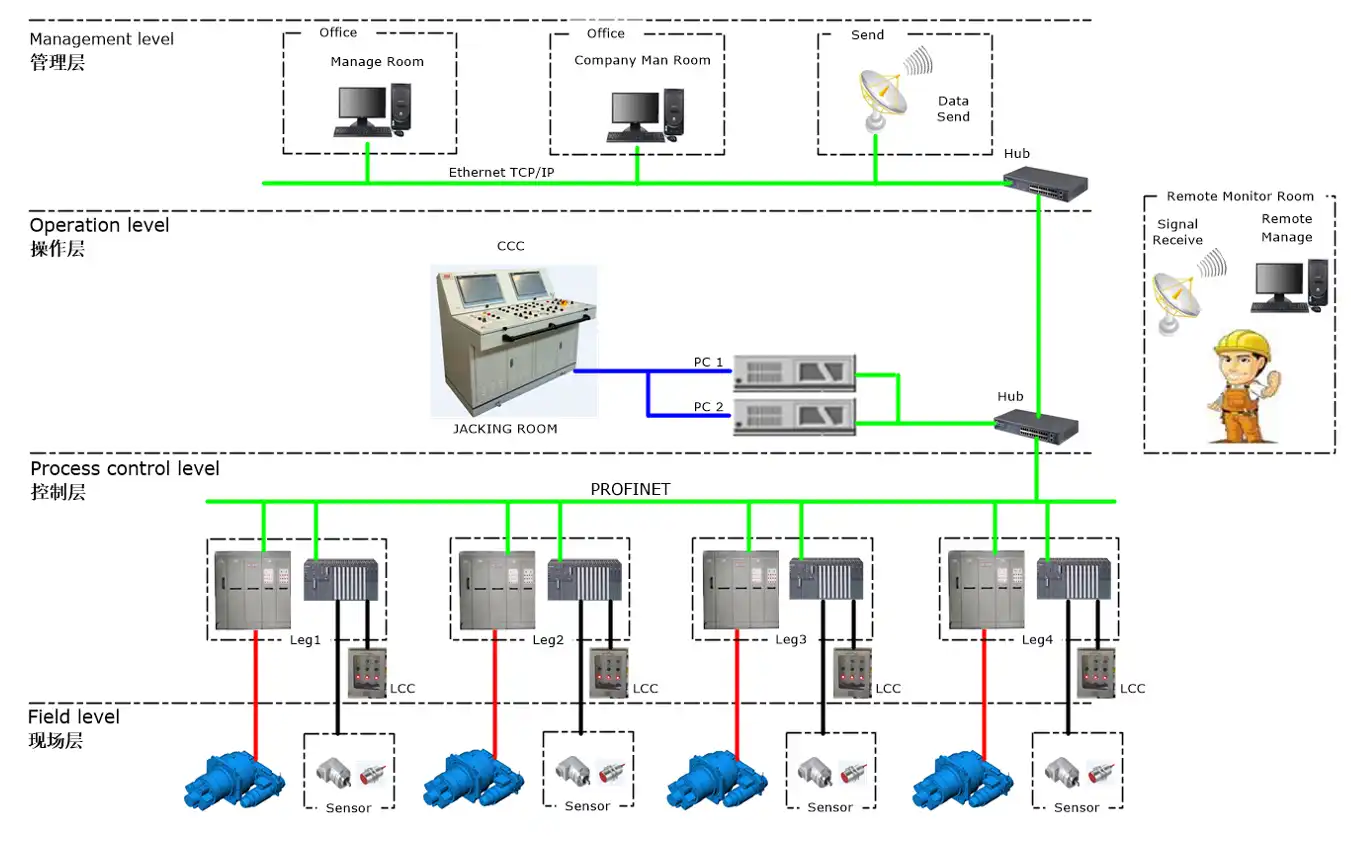CM Energy's brand TSC offers state-of-the-art jacking control systems that incorporate cutting-edge technology for precise hull inclination monitoring. These systems are designed to provide accurate readings and timely alerts, allowing offshore personnel to take swift action when necessary. With over 20 years of experience in marine engineering, TSC's solutions have been widely adopted across various offshore installations, including self-elevating drilling platforms and wind power installation platforms.

Advanced sensors for real-time inclination tracking
The foundation of effective hull inclination monitoring lies in the use of advanced sensors that provide continuous, accurate data. Modern offshore platform jacking control systems employ sophisticated electronic inclinometers and other sensing technologies to track even the slightest changes in platform orientation.
Types of sensors used in hull inclination monitoring
Several types of sensors are commonly used in offshore platform inclination monitoring:
- Electronic inclinometers: These highly sensitive devices measure tilt angles with exceptional precision.
- Accelerometers: Used to detect changes in acceleration, which can indicate shifts in platform position.
- Gyroscopes: Provide data on rotational movement and orientation changes.
- Strain gauges: Measure deformation in structural elements, which can indicate changes in load distribution.
TSC's jacking control system incorporates a combination of these sensors to ensure comprehensive monitoring of hull inclination. The data from these sensors is integrated into the central control system, providing operators with a holistic view of the platform's status.
Data processing and visualization
Raw sensor data is processed by sophisticated algorithms within the jacking control system. This processed information is then presented to operators through user-friendly interfaces, typically featuring:
- Real-time graphical displays of hull inclination
- Trend analysis tools for tracking changes over time
- Color-coded alert systems for quick identification of potential issues
- 3D visualization of platform orientation
By leveraging these advanced monitoring capabilities, offshore personnel can make informed decisions quickly, enhancing overall platform safety and operational efficiency.
Setting multi-stage alarms: Best practices
Implementing a well-designed multi-stage alarm system is crucial for effective hull inclination management. This approach allows for graduated responses based on the severity of the inclination, helping to prevent false alarms while ensuring timely action when necessary.
Establishing threshold levels
When setting up a multi-stage alarm system for hull inclination, it's important to establish appropriate threshold levels. These levels typically include:
- Advisory level: A low-level alert indicating minor deviations from normal
- Warning level: Signals a more significant inclination requiring closer monitoring
- Critical level: Indicates a severe inclination that may require immediate corrective action
- Emergency level: Triggers evacuation procedures or other emergency responses
TSC's Offshore Platform Jacking Control System allows for customizable threshold settings, enabling operators to tailor the alarm system to their specific platform characteristics and environmental conditions.
Integrating alarms with other systems
For maximum effectiveness, hull inclination alarms should be integrated with other critical platform systems, such as:
- Jacking system controls
- Ballast management systems
- Weather monitoring systems
- Emergency shutdown systems
This integration ensures a coordinated response to inclination issues, allowing for automatic adjustments or shutdowns when necessary. TSC's comprehensive jacking control solutions offer seamless integration capabilities, enhancing overall platform safety and operational efficiency.
Crew training: Responding to inclination alerts
Even the most advanced hull inclination monitoring and alarm systems are only as effective as the crew's ability to respond appropriately. Comprehensive training programs are essential to ensure that offshore personnel can interpret alerts correctly and take swift, effective action when needed.
Key elements of inclination response training
Effective crew training for hull inclination management should cover:
- Understanding the offshore platform jacking control system and its components
- Interpreting inclination data and alarm signals
- Procedures for different alarm levels
- Communication protocols during inclination events
- Emergency response and evacuation procedures
- Regular drills and simulations to reinforce skills
TSC provides comprehensive training programs alongside their jacking control system installations, ensuring that crew members are well-prepared to utilize the technology effectively.
Continuous improvement and feedback loops
To maintain and enhance crew proficiency in managing hull inclination, it's important to establish continuous improvement processes. This can include:
- Regular review of inclination events and responses
- Incorporation of lessons learned into training programs
- Periodic reassessment of crew competencies
- Staying updated on industry best practices and technological advancements
By fostering a culture of continuous learning and improvement, offshore operators can ensure that their crews remain well-prepared to handle any inclination-related challenges that may arise.
In conclusion, two essential elements of offshore platform safety are the proper placement of alerts and the efficient monitoring of hull inclination. Through the use of multi-stage warning systems, sophisticated sensor technology, and thorough crew training, operators can greatly improve their capacity to control inclination-related hazards. These demands are met by the industry-leading jacking control systems under CM Energy's TSC brand, which give offshore operators the resources and assistance they need to continue operating safely and effectively in demanding marine environments.
Call to Action
Ready to enhance your offshore platform's safety and efficiency with state-of-the-art hull inclination monitoring? CM Energy's TSC brand offers industry-leading jacking control systems tailored to your specific needs. With over 36 successful installations worldwide and certifications from major classification societies, our solutions provide the reliability and precision you demand. Don't compromise on safety – contact us today at info.cn@cm-energy.com to learn how our advanced Offshore Platform Jacking Control Systems can elevate your operations to new heights of excellence.
